The number of foreign residents in Korea continues to grow and now accounts for some 3.6 percent of the country‘s population. This is part of a series that examines how Korea is grappling with the issue of multiculturalism, as well as the challenges facing new arrivals. -- Ed.
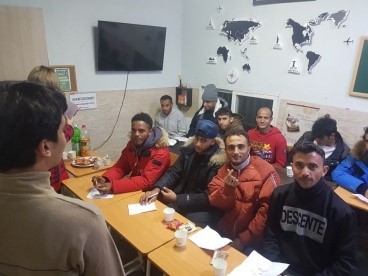 |
Yemeni asylum seekers learn about Korea’s language and culture in Itaewon, central Seoul, at the Union of Yemen Community in Korea. (Union of Yemen Community in Korea) |
When hundreds of Yemenis fleeing war and the humanitarian crisis back home made their way to a South Korean island last year, they were not expecting a warm welcome. But neither did they expected the outcry that labeled them “fake refugees.”
Leaving behind their homeland’s hostility, most of the Yemeni asylum seekers are trying to build their lives and adapt to Korean society until it is safer to return to their war-ravaged country.
Their journey to settle in Korea, however, is riddled with obstacles, highlighting how socially, culturally and legally unprepared South Korea is to embrace asylum seekers of different races and religions.
More than 480 Yemenis arrived on Jeju Island, some 100 kilometers off the country’s southern coast, last spring.
Only two of them were granted refugee status, and 56 were ordered to leave Korea. Some 412 Yemenis were granted temporary “humanitarian stay” permits that allow them to remain in Korea until the situation in Yemen stabilizes.
Now, the majority of them have left the island for the mainland, mostly in search of employment. Some 126 Yemenis remain on the island as of the end of January, according to the Justice Ministry.
Struggle to adjust to life in Korea
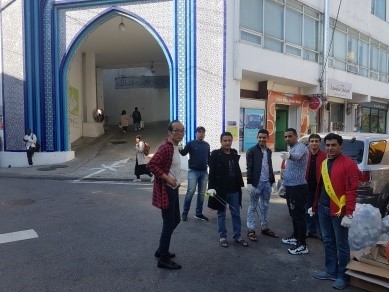 |
Yemeni asylum seekers stand in front of the Seoul Central Mosque in Itaewon, central Seoul. (Union of Yemen Community in Korea) |
After Alnukhbi Mabrook, 26, received a humanitarian stay permit in October, he left the island and began to work as chef at a BBQ restaurant in Incheon.
The situation in Yemen is very difficult, said Mabrook, who left his parents and four sisters at home in the country’s capital Sanaa.
“I ask them how their lives go, whether they are fine, but they say they’re so scared because of bomb explosions. They stay home most of their time. Things are expensive -- gas and electricity. Hospitals are so packed, a lot of people die and suffer from hunger,” he said.
Yemen’s nearly 4-year-old civil war between the Iran-aligned Houthi rebels and Saudi-backed government has killed tens of thousands and displaced and estimated 3.3 million people, according to the Office of the Coordination of Humanitarian Affairs.
More than 20 million people across the country are food insecure, with half of them suffering extreme levels of hunger, the agency said.
For Mabrook, who finally found safe refuge out of Yemen and a job to support his family back home, he could not be thankful enough.
“I would like to thank South Korea for accepting Yemeni people. I am happy now,” he said. “If possible, I want to bring my family here. I want to study Korean. I want to build my life here.”
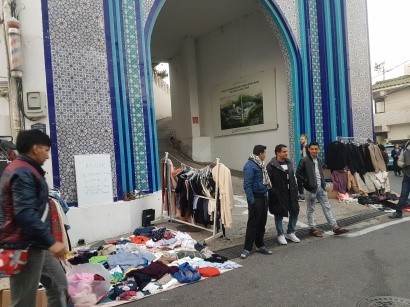 |
Yemeni asylum seekers hold a bazaar in front of the Seoul Central Mosque in Itaewon, central Seoul. (Union of Yemen Community in Korea) |
But in general, life in Korea is not easy for Yemenis -- from getting a job to adjusting to the different culture.
Without any financial support from the government, those who hold humanitarian permits do not have proper access to medical care or education, and cannot invite their families to join them, which activists say makes the Yemenis’ lives insecure.
“I felt happy when I moved out of Jeju. But it was difficult to find work. Not many jobs in winter, and all recruitment agencies tended to avoid humanitarian visa holders,” said Muneer Naji, 26, who recently found work at a factory near Seoul.
Humanitarian status holders are given G-1-6 visas, which are extendable each year. Still, employers prefer to hire those with longer-term visas, activists have said, making it difficult for them to land jobs.
“We cannot speak Korean well, so it is difficult to communicate,” he said. “Also, we like Korean food and respect Korean culture, but it is just different from ours. I try to find Halal food, but I often cannot find it,” said Naji, who arrived on Jeju Island in May last year.
“It is so cold, and even snow! And working for long hours? We are not used to it,” he said with a shy smile.
The Yemenis on Jeju Island received the results of their refugee applications more quickly than usual, amid intense public attention, but many others who arrived here before them still have not even gotten the chance to be interviewed at an immigration office.
Zakarya Alashmaly, president of the Union of Yemen Community in Korea, has been awaiting the results of his refugee application since he arrived in Seoul in June 2017.
While the government reviews refugee claims, which can take up to two years, they are issued G-1-5 visas, extendable every three months. On the visa they are issued a work permit, but only after finding an employer to hire them.
Jobs available for asylum seekers and humanitarian status holders are mostly limited to manual work, because certificates and licenses they bring from home are often not recognized here.
Alashmaly, 28, was a dentist in Yemen and Dubai, but his qualifications are not recognized here. He now works part-time as an assistant at a dental clinic while leading the community to help Yemenis better integrate into Korean society.
Before then, he had worked at four different factories.
“I spent all my life studying,” he said. “Working for factories here was difficult. Sometimes, they swore at me, used racist words. One time, someone hit me and asked me why I came to Korea and why I am here. Some people are not very welcoming of us.
“Still, I mostly feel good and safe here. A lot safer than in Yemen.”
What Jeju refugee crisis tells us
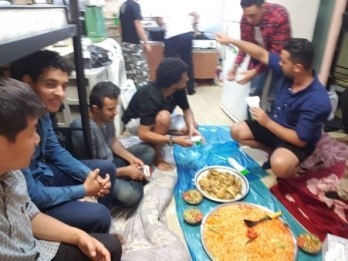 |
Yemeni asylum seekers prepare and share food in Itaewon, central Seoul, at the Union of Yemen Community in Korea. (Union of Yemen Community in Korea) |
“When I tried to find part-time jobs, I felt like I was denied because I came from Yemen. One of them said to me he read about Yemenis from newspapers, and said, ‘No,’” said Hamed Almarhabi, 26, who is in the process of claiming asylum.
The sudden arrival of Yemenis -- an unprecedentedly high number of asylum seekers flooding onto the island at a similar time -- sparked anti-migrant sentiment across a country whose people have had little exposure to asylum seekers or Muslims.
During rallies, anti-immigrant protestors called the Yemenis fake refugees, potential Arab terrorists and rapists.
While many countries in the Middle East and Africa suffering from armed conflicts have fled to Europe for years, South Korea has been a relatively unlikely destination due in part to geographical reasons. South Korea is thousands of miles from the war-torn countries and a de facto island, surrounded by the sea with its only land border being with North Korea.
But recently, South Korea has seen a growing number of asylum seekers entering the country as tourists with on the visa-free policy to claim asylum here.
The government and some activists say a refugee screening system should be toughened so that “fake refugees” -- economic migrants who have left home in search of a higher standard of living -- can be kept out of Korea.
“The refugee screening system should be shortened and stricter,” said Kim Ki-hack, an activist who has supported Yemeni asylum seekers. “Among refugees, there are people who seek to take advantage of the refugee system and gain economic benefits.”
The Justice Ministry has placed 39 officials in charge of screening refugee applications. In 2019, the ministry plans to add 52 more, it said.
“The government also should work together with local communities and NGOs to create a structure in which asylum seekers and refugees can contribute to Korean economy and society, rather than push them out of the legal system.”
Often, asylum seekers find work through recruitment agencies without receiving any vocational training, which makes it more difficult for them to adapt to their work and leaves them more vulnerable to workplace accidents, he noted.
Human rights lawyers and activists also agree on the need for a quicker refugee application process, but they believe that “fake refugees” should not be an excuse to raise the bar for asylum seekers.
“The refugee standards are already too strict, the process takes a long time. In the meantime, those who are awaiting the refugee status are unstable. They also don’t want the application process to be drawn out,” said Kim Yeon-joo, a human rights lawyer at the NANCEN refugee rights center in Seoul.
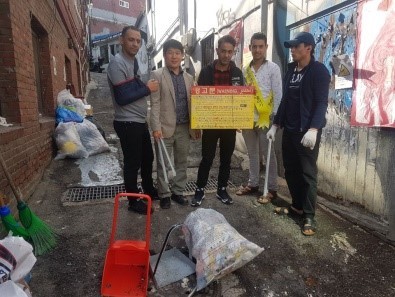 |
Yemeni asylum seekers and activist Kim Ki-hack pick up trash from the streets in Itaewon, central Seoul, near the Union of Yemen Community in Korea. (Union of Yemen Community in Korea) |
Since 1994, Korea has received some 42,000 refugee applications. Among them, only 849 people, or about 2 percent, were granted refugee status by the first half of last year.
Lee Il, a human rights lawyer for Advocates for Public Interest Law, echoed Kim’s view.
“There might be people who choose to apply for refugee status because there are no other channels for them to immigrate to the country. But it should not be an excuse to toughen the refugee screening system,” he said. “The government should secure necessary infrastructure to accurately and rapidly review refugee applications to remove the cause for (non-refugee immigrants) to apply for refugee status.”
The Justice Ministry is pushing to revise the Refugee Act, which went into effect in July 2013, with a new draft to be made public later this month. It plans to submit the revision in the first half of this year, according to the ministry.
Beyond any controversy, the Yemeni asylum seekers on Jeju Island have brought “the invisible” in Korean society to the fore.
“Now, they became visible. In the short term, South Koreans could feel nervous or have prejudice against new people. Given surveys, however, I don’t think South Koreans unconditionally oppose accepting refugees. They would not want to forcibly send back those who are in need of protection,” Lee said.
“In the long term, it was a chance to get more people interested in the refugee issue and open a social discourse.”
By Ock Hyun-ju (
laeticia.ock@heraldcorp.com)












